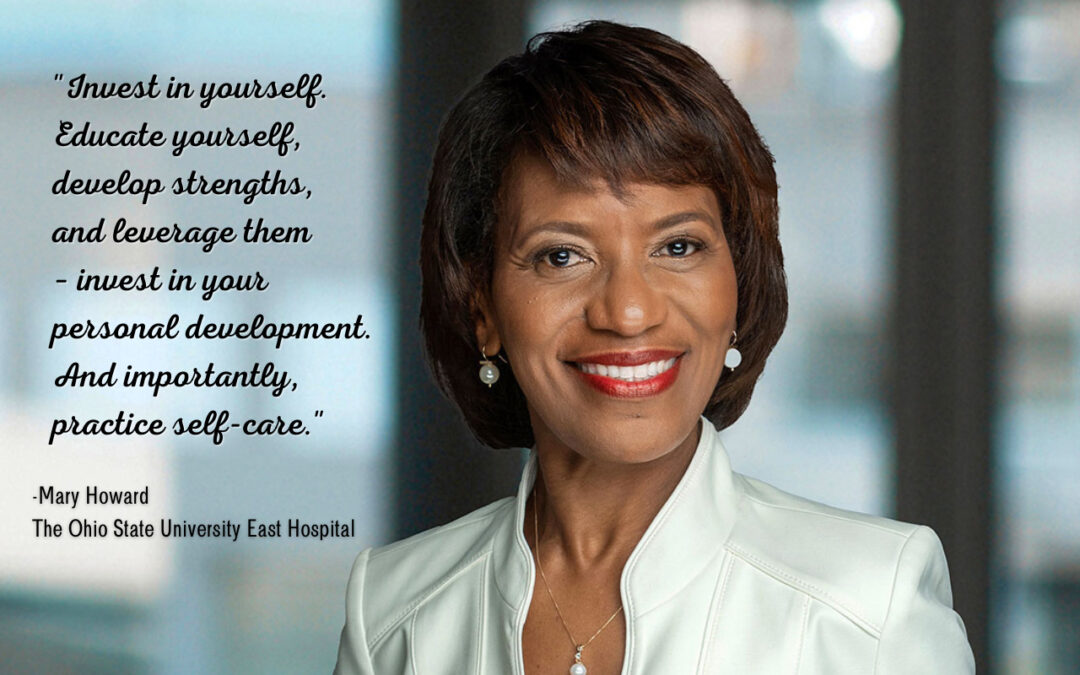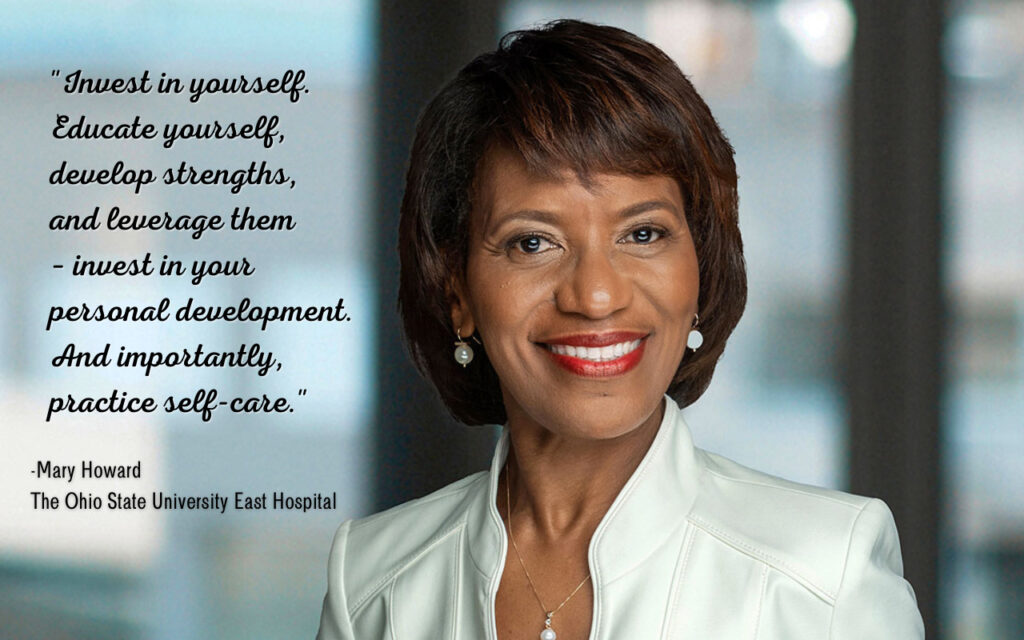Mary Howard, DNP, RN, NEA-BC is the executive director of The Ohio State University East Hospital and is responsible for operations, strategic planning, and program development.
With training in the mediation of workplace and civil rights disputes and alternative dispute resolution, she believes in giving back to the community. She’s a member of the Community Relations Commission with the city of Columbus, the Board of Directors of CRIS (Community Refugee and Immigration Services), and the United Way Key Club.
Howard is an important nursing leader, and we’re pleased to profile her as we celebrate Black History Month with the Black Nursing Leaders Series 2023.
In February, we’ll highlight healthcare leaders who are prominent figures in their organizations and are making transformational impacts in nursing.
Meet Mary Howard, executive director of The Ohio State University East Hospital
Talk about your career path and how you ascended to that role.
II took a career center course in high school to become a nursing assistant in my junior and senior years. I was placed at Columbus Children’s Hospital in Columbus, Ohio as a junior nurse’s aide and progressed to become a senior nurse’s aide. I continued working at Columbus Children’s Hospital while earning my bachelor’s degree in nursing and as a student nursing assistant. Upon graduation, I stayed at Columbus Children’s Hospital and worked as a new grad/staff nurse. I was always interested in becoming a nurse leader. My ultimate goal was to become the chief nursing officer at Columbus Children’s Hospital. However, life sometimes takes us down different paths.
I looked for opportunities to grow as a leader by participating in committees, community involvement, and learning from mentors. My first leadership role at Columbus Children’s Hospital was as a nurse manager three years into my tenure as a nurse. From there, I had the opportunity to serve in progressive nursing leadership roles. First, I was an assistant director at Columbus Children’s Hospital. I later became a director of nursing and chief nursing officer at another organization before coming to The Ohio State University Wexner Medical Center. Before my role as executive director, I served as a nursing director and chief nursing officer at Ohio State Wexner Medical Center.
I have come “full circle.” The learning lab for the career center course I took in high school was at the hospital where I currently work (formerly St. Anthony Hospital). So I went from learning how to give a bed bath and make a hospital bed to serving as the executive director at this hospital and in a neighborhood close to where I grew up – it warms my heart.
What inspired you to become a nurse?
My healthcare journey was influenced early on by my mother. When my siblings and I were younger, on the weekends, she would take us to visit the residents at the nursing home where she worked. I noticed how much our presence made a difference in the lives of the residents, especially those who did not have a family. This fueled a lifelong passion for caring for others and giving back at an early age. I am thankful to my mother for providing me with this lesson, instilling the value of caring for others, and showing empathy and compassion. By the time I was in middle school, I knew that I wanted to be a nurse.
What are the most important attributes of today’s nursing leaders?
Given the ever-changing healthcare environment and stressors created by the pandemic, today’s nursing leaders must create a culture that promotes the health and well-being of their staff, which will positively impact patient care. Nurse leaders who show compassion and empathy help reduce stress among their staff, decrease burnout, and may serve to improve nurse retention. Critical thinking and decision-making skills are essential for nurse leaders to lead through uncertainty and changing times. It is also important to listen to staff, solicit their ideas and involve them in decision-making when possible. Finally, it is always important to lead with integrity to build trust with their team(s), colleagues, and patients: say what you mean, mean what you say, and follow through.
What does it mean to you to be a nursing leader, and how are you making a difference?
I consider it an honor and privilege. It’s a huge responsibility. I strive to make a difference by making decisions that are in the best interest of staff and patient care. Encourage work-life balance, allowing flexible and creative work schedules. Promoting nursing excellence ensures we provide the best possible care to our patients. Celebrating and recognizing staff and, importantly, mentoring and developing future leaders.
What is the most significant challenge facing nursing today?
Staffing shortages leaving staff working long hours and burnout is a major challenge today. Working in a pandemic/post-pandemic climate is stressful. There has been a rise in aggressive behaviors toward healthcare workers and staff are concerned for their safety.
As a nursing leader, how are you working to overcome this challenge?
To overcome these challenges, we promote a positive work culture, offer flexible work schedules, and encourage staff to take advantage of the wellness/self-care programs the organization provides. In addition, we are ensuring adequate staffing and advocating/supporting policies that support staff. It is also essential that we offer market-competitive salaries.
What nursing leader inspires you the most?
It isn’t easy to pick just one, so I would like to highlight two nursing leaders in our organization that are genuinely making a difference. Reggie Pryear is the chief nursing officer at Ohio State Wexner Medical Center East Hospital. He is a strong advocate for nurses. He rounds on the units daily and is very visible to staff. He listens to their concerns and ideas to understand their perspective and includes them in decision-making. He promotes nursing excellence and opportunities for advancement and celebrates staff achievements.
Bernadette Melnyk is the chief wellness officer of The Ohio State University and dean of The Ohio State University College of Nursing. She is a nationally recognized leader and researcher. She has established innovative programs at the college to educate nurses of today and build a pipeline for the future. She has guided the university in “its vision to become the healthiest university and community in the world.”
What inspirational message would you like to share with the next generation of nurses?
Early in my career as a staff nurse and nurse leader, I learned that you must cultivate relationships. The patients we serve and the people we lead must trust us. You must earn it -you can’t just ask for it. Relationships are the threads of teamwork. So, in addition to investing in others, invest in yourself. Educate yourself, develop strengths, and leverage them – invest in your personal development. And importantly, practice self-care.
Is there anything else you’d like to share with our readers?
Healthcare is at the heart of what we do and what I am passionate about—improving people’s lives, providing access to care, and treating people with dignity and respect. Serving and caring for individuals translates to serving and caring for communities. Access to healthcare, especially in underserved communities, is vitally important, and I am proud to be able to do that in a community nearby where I grew up. I am proud to support, promote and sponsor such programs as Moms2B – a program aimed at reducing infant mortality and our annual Healthy Community Day, where we offer several free health screenings. Addressing healthcare disparities and ensuring equitable healthcare is important to me and a purpose I stand ready to fulfill.
- Meet a Champion of Nursing Diversity: Kendra Coles - April 3, 2024
- Meet a Champion of Nursing Diversity: Barbara Bosah - March 13, 2024
- Tune Into New Podcast Series: Conversations About Health Care Delivery in the United States - March 7, 2024




